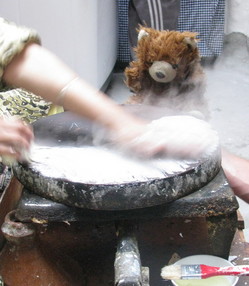Eggs that can’t be beaten
Leave a Comment Last night Barnaby stayed up quite late touring the bars of Takoradi, so when he got up this morning he was ready for a hearty breakfast. And when he went out into the street he realized that he wasn’t going to have much trouble finding one – every street corner was filled with little stalls, and every other stall was run by a friendly lady selling some kind of delicious-looking food.
Last night Barnaby stayed up quite late touring the bars of Takoradi, so when he got up this morning he was ready for a hearty breakfast. And when he went out into the street he realized that he wasn’t going to have much trouble finding one – every street corner was filled with little stalls, and every other stall was run by a friendly lady selling some kind of delicious-looking food.
So it didn’t take long to find what he was looking for: street egg. A big herby peppery omelette cooked fresh right in front of him – then stuffed into a big wodge of sweet doughy bread and cooked some more. Yum. Just the thing to get you ready for a hot day in the market – especially when you wash it down with a great big mug of hot condensed milk and sugar (or as it’s known round here, “coffee”).
And as he chewed thoughtfully (for him) on his egg sandwich, he thought back to some of his favourite parts of the journey.  Chermoula sardines in Morocco, deep-fried fataya in Senegal, rice galettes in Mali, porc au four in Burkina Faso … and last night’s goat kebabs and spicy octopus, of course … they’d all been delicious, and they’d all been made and eaten on the street.
Chermoula sardines in Morocco, deep-fried fataya in Senegal, rice galettes in Mali, porc au four in Burkina Faso … and last night’s goat kebabs and spicy octopus, of course … they’d all been delicious, and they’d all been made and eaten on the street.
Perhaps this was no coincidence? The only disappointing food he’d had on the whole trip had been in restaurants and hotels. Street food must be where it’s at, he decided. And went up the road for some keliweli and spicy yam chips.













